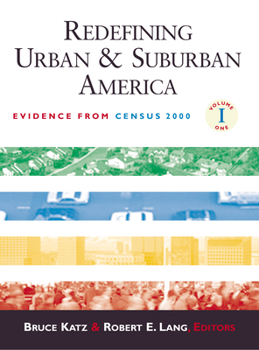Redefining Urban and Suburban America: Evidence from Census 2000; Volume One
Select Format
Select Condition 
Book Overview
The early returns from Census 2000 data show that the United States continued to undergo dynamic changes in the 1990s, with cities and suburbs providing the locus of most of the volatility. Metropolitan areas are growing more diverse--especially with the influx of new immigrants--the population is aging, and the make-up of households is shifting. Singles and empty-nesters now surpass families with children in many suburbs. The contributors to this...
Format:Paperback
Language:English
ISBN:0815748590
ISBN13:9780815748595
Release Date:January 2003
Publisher:Globe Pequot Publishing Group Inc/Bloomsbury
Length:316 Pages
Weight:1.10 lbs.
Dimensions:0.8" x 6.8" x 9.3"
Customer Reviews
1 rating
interesting data, uneven interpretation
Published by Thriftbooks.com User , 19 years ago
This book (or more accurately, set of books) is a list of essays on what 2000 census data tells us about American cities and suburbs. The first (and most interesting) volume focuses not just the fate of cities as a whole, but the growth of individual neighborhoods within cities and changes in the ethnic and social composition of various cities and suburbs. The second is more focused on immigration and housing (telling us, not suprirsingly, that the former was more numerous than before during the 1990s, and the latter became more expensive), but does have some interesting essays on poverty and overcrowding. A few of the more interesting facts: *80 of America's 100 largest cities actually gained population in the 1990s. Many of them gained not only singles, but married-couple families: not just sprawling Sun Belt cities that grew through annexation, but even denser, more singles-oriented cities like New York City (11% growth) and Portland (17% growth). *But despite constant media caterwauling about gentrification, most of this growth was due to working-class, usually Latino, immigration rather than to an invasion of upscale whites. Many allegedly gentrifying cities (e.g. NYC, Chicago) gained population, but lost non-Hispanic whites. And though poverty rates declined slightly in many cities, most cities still had poverty rates far higher than their suburbs. For example, Chicago had a 19.6% poverty rate, as opposed to its suburbs' 5.6%. Even the residents of more prosperous cities like San Francisco and Portland were more likely to be poor than suburbanites; in both places, city poverty was 11-13% and suburban poverty 6-8% (Portland having slightly higher numbers in both categories). *Similarly, cities had fewer higher-income households than their suburbs. In the 100 largest American cities, only 16.6 percent of households had incomes in the top quintile nationally (that is, top 20 percent)- and that number includes some "cities" that are really suburbs, such as Plano, Texas, a suburb of Dallas. Again, even some fairly prosperous cities did not reach the 20 percent mark, such as Portland (16.4%) and Boston (15.0%). By contrast, suburbs consistently contained a disproportionate share of high income households- in the average metro area, 25.5% of suburban households were in the top 20% of earners nationally. *Poverty was less concentrated than in the 1980s; the number of very poor city census tracts (i.e. 40% poverty rate or below) declined by 21% in the 1990s. *Within cities, varying patterns emerged. Downtowns gained population in most cities, even some declining ones. But in many cities, inner-city neighborhoods near downtown lost population while outer-ring neighborhoods near suburbia were more successful (especially in cities with undeveloped land at the fringes, the latter in built-out cities). *In all but the most fast-growing areas, suburban decline is common. Nationally, about a quarter of suburbs lost population in the






